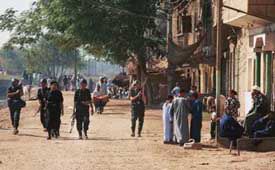 |
| Vol. 2 No. 1 | January 2000 |
Hopes that sectarian violence in Egypt was on the decline were suddenly dashed early this month by the outbreak of massive rioting in the southern Egyptian that left eighteen Coptic Christians and two Muslims dead.
The violence originated on New Year's Eve in the predominantly Coptic village of el-Kusheh, 275 miles south of Cairo, when a Muslim fruit vendor, Fayez Awad, tried to purchase some textiles on credit from a Christian shop owner, Rashid Fahim Mansour. The latter declined and allegedly insulted Awad. Two days later, Awad returned with one or two of his brothers to demand an apology but Mansour refused. The heated argument that followed soon erupted into a fist fight and then an exchange of gunfire. The situation rapidly escalated when unidentified persons went from door to door calling for assistance from neighboring Muslims, who then converged on the scene brandishing clubs and automatic weapons. In the ensuing melee, three people were wounded.
Egyptian police soon intervened and calm prevailed until they withdrew from the village the next morning, when massive rioting and looting by Muslim protesters erupted and spread to the nearby villages of Awlad Khalaf, Awlad Tuq Gharb, Dayr al-Nafafish, Naj'a Musa, Nu'ayrat, Baramar and Dar al-Salam. By the time security forces backed by personnel carriers restored order later in the day, 18 Christians and two Muslims had been killed, while 14 Christian and 19 Muslims were wounded. Some of these casualties were attributed to security forces, who opened fire to disperse protesters.
 |
| Egyptian security forces patrol a Christian neighborhood in el-Kusheh in the aftermath of the violence |
An investigation into the events is underway by the Public Prosecutor's Office.
Sectarian tensions in el-Kusheh have been unusually high since the 1998 murder of two Christians in the village. The predominantly Muslim police force not only failed to apprehend the murderers, but allegedly detained and tortured several Coptic villagers in an effort to secure a confession from a Christian.
The most puzzling aspect of the recent violence is the apparent absence of any prior agitation by Islamic fundamentalist groups, who have never had a presence in el-Kusheh. That hundreds of ordinary Muslim villagers spontaneously decided to lash out violently against their Christian neighbors is indicative of deep societal problems afflicting the rural communities of southern Egypt. "I don't rule out that some instigators took advantage of such a small incident to spread the fire of hatred," says sociologist Saadeddin Ibrahim. "What is worrisome and is really alarming to me is how easily people responded to instigation and provocation."1
Samah Fawzy, author of the book Out of the Sectarian Tunnel: Coptic Problems in Egypt argues that Egyptian government "has participated in creating this problem," pointing to the lack of adequate political representation of Egyptian Copts and a discriminatory law prohibiting them from building churches without presidential authorization. "The areas of discrimination create an unhealthy atmosphere and encourages extremists to attack Copts," he said.3
Rather than addressing these underlying problems, however, the Egyptian government blamed "criminal elements" for causing the riots.2 In typical conspiratorial fashion, the Egyptian press has alluded to foreign manipulation of sectarian tensions in Egypt. One prominent newspaper explicitly accused "Egypt's enemies" of attempting to undermine the country's stability by "pouring their venom into the hearts of el-Kusheh Christians to set them against their Muslim brothers."4
1 Al-Ahram Weekly, 6-12 January 2000.
2 Reuters, 3 January 2000.
3 Middle East Times, 15 January 2000.
4 Al-Wafd, 6 January 2000.